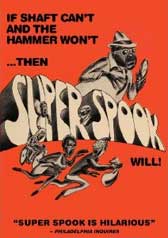 SUPER
SPOOK (1975)
SUPER
SPOOK (1975)Director: Anthony Major
Scorpion Releasing
 SUPER
SPOOK (1975)
SUPER
SPOOK (1975)Spoofs of the blaxploitation genre are as common today as late night infomercials with super soul parodies such as I’M GONNA GIT YOU SUCKA and more recently, BLACK DYNAMITE. With its short title which blatantly screams satire, SUPER SPOOK is probably the first of its kind, shot in 1972-73 while the genre was at its height (and infancy), using an improvisational, guerilla style of filmmaking similar to SWEET SWEETBACK'S BAADASSSSS SONG, while taking advantage of the streets of New York City as its backdrop, much like SHAFT and SUPERFLY, two films in which SUPER SPOOK was lightly emulating.
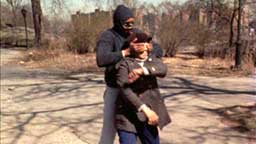
In Harlem, a “Bag Woman” (Virginia Fields, the director's mother) makes cash collections from various businesses, keeping the stash in a brown paper bag. One day, she is spotted by Hi-Ho (Bill Jay), a shifty character in need of some easy money to impress his materialistic girlfriends. In a Lone Ranger mask, Hi-Jo mugs the Bag Woman, who puts up a good fight, and he gets away (making like a horse, MONTY PYTHON AND THE HOLY GRAIL style) with her collection money. The Bag Woman’s daughter (Marcella Lowery) goes to the apartment of Super Spook (Leonard Jackson, FIVE ON THE BLACK HAND SIDE), a private detective who is supposedly the best in town. The short, awkward and less than streetwise Super Spook takes on the case, making it his top priority to comb the streets of Harlem in search of the perpetrator because as he says, and his business card says, and as the tagline of the film says, “If Shaft can't and The Hammer won't ...then Super Spook will!”
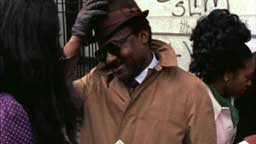
Given that most blaxploitation films of the early 1970s were loaded with violence, sex and other exploitive elements, SUPER SPOOK's take on the urban crime genre is done in a rather harmless manner, and even though the title character is introduced wiping his back side on the toilet seat, the film steers from being crude, with only a handful of four letter words and some humorous sexual innuendo (and double entendres) in tow. From the word go, you’ll have no trouble recognizing that the film had no script (even though the screenplay is credited to a number of different participants), and it’s ad-libbing style tries to inject as much humor as possible, much of it disposable or causing the scenes to drag on way too long (it’s no wonder why distributor Levitt-Pickman wanted it trimmed down before its 1975 theatrical release).
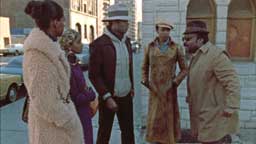
Its entertainment value aside, SUPER SPOOK stands as a curiosity piece of blaxploitation cinema, giving us a nostalgic glimpse at the early morning streets of Harlem and Central Park in the early 1970s, and director Anthony Major made the film with friends and family with mere pocket change, using equipment borrowed from NYU. It’s basic premise was to follow classic detective films, with Leonard Jackson (an actor you’ve seen in countless sitcoms and movies) as a square, pint-sized, rain-coated sort of Columbo/Clouseau who’s the total opposite of a Shaft, Slaughter or other private dicks that are sex machines to all the chicks. Major also tosses in references to other blaxploitation movies and comic book super heroes, bizarre comedy antics such as the title character getting two “white eyes” (which are soothed with a ham hock!), some sped-up and slow-mo slapstick bits, and a mad climatic chase scene with bicycles! A number of the secondary players show up in different roles throughout the running time, adding to the film’s “anything goes” approach.
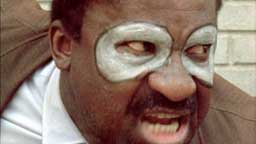 SUPER
SPOOK was originally shot on 16mm and then blown up 35mm, with optical effects,
titles, etc. added later for its theatrical release prints. Scorpion’s
visual presentation of the film is more than handsome, giving the film a letterboxed
(1.78:1) anamorphic transfer, where grain is usually present but never distacting,
detail is sharp and colors look pretty vivid. The mono English audio track (which
features a top notch soul score by Rheet Taylor) also comes off fine. This is
the longer version of the film, running over 1 hour and 45 minutes.
SUPER
SPOOK was originally shot on 16mm and then blown up 35mm, with optical effects,
titles, etc. added later for its theatrical release prints. Scorpion’s
visual presentation of the film is more than handsome, giving the film a letterboxed
(1.78:1) anamorphic transfer, where grain is usually present but never distacting,
detail is sharp and colors look pretty vivid. The mono English audio track (which
features a top notch soul score by Rheet Taylor) also comes off fine. This is
the longer version of the film, running over 1 hour and 45 minutes.
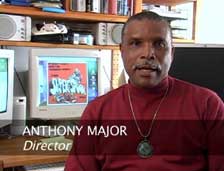 “Looking
Back: The Making of SUPER SPOOK” (53:03) is a terrific documentary containing
interviews with director Major, producer Ed Dessisso, editor Sandy Tung, Tony
King (who plays corrupt cop Sgt. Sandwich in the film, and also is credited
with a number of other tasks on it), actor Randy Harris (“Tippy Bernadette”
in the film) and star Billy Jay (“Hi-Ho”). The interviews are solid,
as the participants recall what it was like shooting (what was for most of them)
their first movie, made on 16mm “short ends” with basically no budget
and borrowed film equipment. All the participants from the documentary (except
for Jay) are present for an audio commentary. While not as interesting as the
documentary (there are lulls when they’re just laughing and watching what’s
on screen), there’s still a lot of info shared and some scene-specific
anecdotes. Tony King is back for a nice little featurette called “Tony
King in Italy” (9:04), as the actor recalls getting cast (in Atlanta)
to be in Antonio Margheriti’s CANNIBAL APOCALYPSE, and the handful of
Italian exploitation films which followed from there. “Off-Duty”
(7:10) is a short black and white movie made by director Major. It’s an
amusing NYU project which features Billy Jay as a black man having a hard time
hailing a cab in early 1970s Manhattan, and all the tricks he has to pull to
get one to stop. It also features a cameo by SUGAR HILL actress Marki Bey. SUPER
SPOOK's original theatrical trailer and a still gallery (featuring a number
of black and white, behind-the-scenes shots) round out the disc’s extras.
(George
R. Reis)
“Looking
Back: The Making of SUPER SPOOK” (53:03) is a terrific documentary containing
interviews with director Major, producer Ed Dessisso, editor Sandy Tung, Tony
King (who plays corrupt cop Sgt. Sandwich in the film, and also is credited
with a number of other tasks on it), actor Randy Harris (“Tippy Bernadette”
in the film) and star Billy Jay (“Hi-Ho”). The interviews are solid,
as the participants recall what it was like shooting (what was for most of them)
their first movie, made on 16mm “short ends” with basically no budget
and borrowed film equipment. All the participants from the documentary (except
for Jay) are present for an audio commentary. While not as interesting as the
documentary (there are lulls when they’re just laughing and watching what’s
on screen), there’s still a lot of info shared and some scene-specific
anecdotes. Tony King is back for a nice little featurette called “Tony
King in Italy” (9:04), as the actor recalls getting cast (in Atlanta)
to be in Antonio Margheriti’s CANNIBAL APOCALYPSE, and the handful of
Italian exploitation films which followed from there. “Off-Duty”
(7:10) is a short black and white movie made by director Major. It’s an
amusing NYU project which features Billy Jay as a black man having a hard time
hailing a cab in early 1970s Manhattan, and all the tricks he has to pull to
get one to stop. It also features a cameo by SUGAR HILL actress Marki Bey. SUPER
SPOOK's original theatrical trailer and a still gallery (featuring a number
of black and white, behind-the-scenes shots) round out the disc’s extras.
(George
R. Reis)